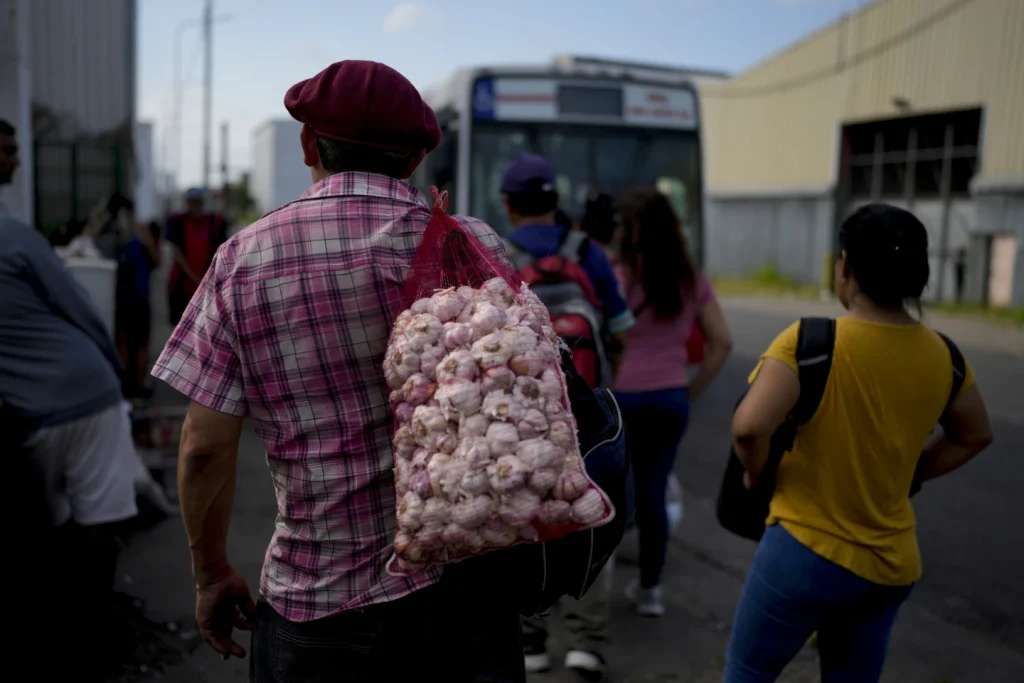The recent economic developments in Argentina have raised significant concerns both domestically and internationally.
The staggering annual inflation rate of 211.4% in 2023, as reported by the government’s INDEC statistics agency, marks the highest level in 32 years.
This drastic surge in inflation is a clear indication of the profound impact of the shock measures implemented by President Javier Milei’s administration, including a 50% devaluation of the nation’s currency.
The economic policies pursued by the current right-wing government have been aimed at addressing the country’s persistent inflationary pressures.
However, the substantial increase in inflation from approximately 95% in 2022 to the current alarming rate has sparked widespread apprehension and raised questions about the effectiveness of the measures undertaken.
The monthly inflation rate of 25.5% in December, compared to 12.8% in November, further underscores the severity of the situation.
While this figure is slightly below the government’s forecast of 30%, it still represents a significant and concerning level of inflation.
President Milei’s prior statement regarding the significance of meeting the forecasted monthly inflation rate highlights the administration’s awareness of the challenges at hand.
The economic ramifications of such hyperinflation are far-reaching and have profound implications for the lives of Argentine citizens.
Rapidly rising prices erode purchasing power, diminish savings, and create uncertainty for businesses and consumers alike.
Moreover, high inflation can exacerbate income inequality and hinder long-term economic growth, posing a formidable obstacle to the country’s overall development.
In light of these developments, it is imperative for the Argentine government to reassess its economic policies and pursue comprehensive strategies to address the root causes of inflation.
While short-term measures such as currency devaluation may have been implemented with the aim of stabilizing the economy, a sustainable solution demands a holistic approach that addresses underlying structural issues.
Furthermore, transparent communication and proactive engagement with stakeholders, including businesses, financial institutions, and the general public, are crucial in fostering confidence and stability in the economy.
The government must work to rebuild trust and credibility in its economic management to mitigate the impact of the current inflationary crisis.
Internationally, the soaring inflation in Argentina has implications for global economic dynamics, particularly in relation to trade and investment.
The potential spillover effects on neighboring countries and international markets underscore the interconnectedness of the global economy and the need for coordinated responses to address economic challenges.
In conclusion, the unprecedented inflation levels in Argentina present a critical test for the government’s economic policies and its ability to navigate the current crisis.
Addressing the root causes of inflation, restoring confidence, and fostering sustainable economic stability are imperative to mitigate the adverse effects on the country’s economy and its people.
The path forward demands a concerted effort, both domestically and internationally, to chart a course towards economic recovery and resilience in the face of formidable challenges.
As the situation continues to unfold, close attention to economic developments in Argentina remains essential, and proactive measures to address the underlying issues are paramount for the country’s long-term prosperity and stability.
The recent inauguration speech of Milei, the newly appointed leader of a nation facing economic turmoil, has sparked widespread discussions and debates regarding the future of the country’s economy.
With a focus on implementing a painful adjustment plan to combat hyperinflation, as well as addressing the prevalent issue of poverty, Milei’s proposed policies have generated both anticipation and apprehension among the populace.
This essay aims to delve into the potential implications of Milei’s economic measures, the challenges they may pose, and the feasibility of his proposed strategy to stabilize the macroeconomic landscape and ultimately transition to a dollarized economy.
Milei’s assertion that a success rate closer to 25% would signify a tremendous achievement is indicative of the magnitude of the challenges faced by the nation.
This statement underscores the severity of the economic predicament and the formidable task ahead for his administration.

By acknowledging the need for a painful adjustment plan, Milei has signaled a departure from conventional policies, opting for bold and potentially disruptive measures to address the prevailing economic crisis.
The acknowledgment that the proposed measures will initially have a negative impact on various socio-economic indicators, including activity levels, employment rates, real wages, and the number of individuals living in poverty, highlights the inherent trade-offs and sacrifices that may be necessary to steer the economy away from the brink of hyperinflation.
This candid assessment sets the stage for a critical examination of the potential short-term hardships that the populace may endure in the pursuit of long-term economic stability.
The staggering statistic that approximately 40% of the population live in poverty underscores the urgent need to address the pervasive issue of inequality and social deprivation.
Milei’s administration faces the formidable challenge of devising inclusive policies that not only alleviate poverty but also foster sustainable economic growth and equitable distribution of resources.
The impact of the proposed adjustment plan on the most vulnerable segments of society necessitates a comprehensive social safety net to mitigate the adverse effects on the marginalized population
Milei’s assertion that once macroeconomic variables stabilize, he intends to transition the economy to a dollarized system introduces a contentious proposal with far-reaching implications.
While dollarization may offer stability and curb hyperinflation, it also raises concerns about relinquishing control over monetary policy and the potential impact on domestic industries and employment.
The transition to a dollarized economy warrants a meticulous assessment of its ramifications on exchange rates, trade dynamics, and the overall economic sovereignty of the nation.
The feasibility of Milei’s proposed economic measures hinges on the efficacy of the adjustment plan in curbing hyperinflation and laying the groundwork for macroeconomic stability.
The successful implementation of such a plan requires adept policy formulation, effective governance, and widespread public support.
Moreover, the administration must navigate the complexities of mitigating short-term hardships while engendering confidence in the long-term benefits of the proposed measures.
Milei’s inauguration speech and the subsequent articulation of his economic policies have ignited fervent discussions on the trajectory of the nation’s economy.
The formidable task of addressing hyperinflation, poverty, and inequality necessitates a judicious balance between short-term sacrifices and long-term gains.
The proposed transition to a dollarized economy adds a layer of complexity to an already intricate economic landscape, warranting meticulous deliberation and prudent decision-making.
As Milei’s administration embarks on this arduous journey, the nation awaits with cautious optimism, cognizant of the challenges and opportunities that lie ahead.
In conclusion, the economic challenges and policy proposals articulated by Milei’s administration underscore the imperative of bold and decisive measures to steer the nation away from the precipice of economic turmoil.

The path ahead is fraught with complexities and uncertainties, necessitating astute governance, inclusive policies, and a steadfast commitment to addressing the multifaceted dimensions of the economic crisis.
As the nation grapples with these challenges, the efficacy and implications of Milei’s proposed measures will undoubtedly shape the trajectory of the nation’s economic future.
The surge in the prices of food and non-alcoholic beverages has been a cause for concern, with the annual inflation rate being significantly impacted.
According to data from INDEC, these essential items witnessed an average increase of 29.7% in December.
This substantial rise in prices has not been limited to food and beverages alone, as other products meant for mass consumption experienced a similar trend, with an average increase of around 30%.
Furthermore, medications, which are crucial for maintaining public health, saw an alarming average increase of 40%.
The implications of these inflationary trends are far-reaching, affecting the daily lives of individuals and families. The rising cost of living has placed a strain on household budgets, making it increasingly challenging for people to afford basic necessities.
This has led to heightened concerns about financial stability and the ability of individuals to meet their essential needs.
In response to these developments, consultancy firm Eco Go has sounded a note of caution, predicting a slight slowdown in food prices in the initial days of January.
Additionally, they have projected a monthly increase in the cost of living that is lower than the 23% recorded in December.
While this forecast offers a glimmer of hope, it is essential to remain vigilant and closely monitor the situation to ensure that the projected slowdown materializes.
Amidst these economic fluctuations, notable figures in the financial sphere have offered their insights. For instance, economist Milei highlighted the ongoing process of rearrangement of relative prices, indicating that the current inflationary period may persist.
However, he also expressed optimism about a potential decline in inflation in the future, suggesting that the trajectory of these economic indicators may not be entirely bleak.
The complex interplay of factors contributing to inflation underscores the need for a comprehensive understanding of economic dynamics.
From supply chain disruptions to shifts in consumer behavior and global economic trends, multiple variables influence the pricing of essential goods.
As such, addressing inflationary pressures requires a multi-faceted approach that considers both short-term interventions and long-term strategies aimed at fostering economic stability.
In light of these developments, policymakers, economists, and stakeholders at large must collaborate to devise effective measures to mitigate the impact of inflation on the populace.
This may involve targeted interventions to support vulnerable populations, initiatives to bolster domestic production and supply chains, and policies aimed at promoting price stability.
Furthermore, enhancing transparency and communication regarding economic trends and forecasts is crucial for fostering public understanding and confidence.

By providing accessible information and engaging in constructive dialogue, authorities can empower individuals and businesses to make informed decisions amidst economic volatility.
In conclusion, the recent surge in food and non-alcoholic beverage prices, along with the broader inflationary trends, underscores the urgency of addressing economic challenges.
While the immediate future may present formidable obstacles, proactive measures and collaborative efforts can pave the way for a more stable and sustainable economic landscape.
By navigating these challenges with resilience and foresight, we can work towards a future where the burden of inflation is alleviated, and individuals can access essential goods and services without undue financial strain.
